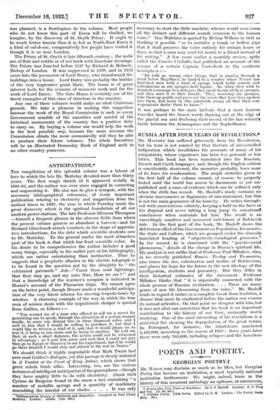ANTICIPATIONS.*
Tim compilation of this splendid volume was a labour of love to which the late Dr. Mottelay devoted more than thirty years. The first rough sketch of it appeared serially in 1891-92, and the author was ever since engaged in correcting and augmenting it. His aim was to give a synopsis, with the necessary bibliographical references, of every important publication relating to electricity and magnetism from the earliest times to 1821, the year in which Faraday made the great discovery which is the spiritual foundation of all our modern power-stations. The late Professor Silvanus Thompson —himself a frequent gleaner in the obscure fields from which the present volume garners so abundant a harvest—and Sir Richard Glazebrook attach vouchers, in the shape of apprecia- tive introductions, for the debt which scientific students owe to Dr. Mottelay. To the general reader the most attractive part of the book is that which has least scientific value. In his desire to be comprehensive the author includes a good many things, especially in the earlier part of his bibliography, which are rather entertaining than instructive. Thus he suggests that a prophetic allusion to the electric telegraph is to be found in the question put by the Almighty to "the celebrated patriarch" Job—" Canst thou send lightnings, that they may go, and say unto thee, Here we arc ? " and that a knowledge of the mariner's compass is indicated in Homer's account of the Phaeacian ships. We cannot agree on the latter point, though Horner made a wonderful anticipa- tion of the very latest scheme for steering torpedo-boats by wireless. A charming example of the way in which the true man of science deals with the importunate sharper is quoted from Galileo, as follows :—
" You remind me of a man who offered to sell me a secret for permitting one to speak, through the attraction of a certain magnet needle, to some one distant two or three thousand miles, and I said to him that I would be willing to purchase it, but that I would like to witness a trial of it, and that it would please me to test it, I being in one room and he being in another. He told me that, at such a short distance, the action could not be witnessed to advantage ; so I sent him away and said that I could not just then go to Egypt or Muscovy to sec his experiment, but if he would go there himself I would stay and attend to the rest in Venice."
We should think it highly improbable that Mark Twain had
ever read Galileo's dialogue, yet this passage is closely imitated in A Yankee at the Court of Ring Arthur, which shows that great minds think alike. Interesting, too, are the various
instances of intelligent anticipation of the gramophone—though they have mighty little to do with electricity. About 1650 Cyrano de Bergerac found in the moon a box containing "a number of metallic springs and a quantity of machinery resembling the interior of our clocks. . . . It was only
• *Bibliographical History of Electricity and Magndisns. Complied by Paul Fleury Mottelay. London: Griffin. [42e. net.] necessary to start the little machine, whence would soon come all the distinct and different sounds common to the human voice.". One Walchius is quoted by Bishop Wilkins in 1641 as thinking it possible "so to contrive a trunk or hollow pipe that it shall preserve the voice entirely for certain hours or days, so that a man may send his words to a friend instead of his writing." A few years earlier a monthly review, aptly called the Courier Viritable, had published an account of the voyage of a certain Captain Vosterloch to the southern hemisphere :— " He tells us, among other things, that in passing through a' strait below Magellan's, be landed in a country where Nature has furnished men with a kind of sponge which holds sounds and articulations as our sponges hold liquids. So, when they wish to dispatch a message to a distance, they speak to one of these sponges, and then send it to their friends. They, receiving the sponges, take them up gently and press out the words that have been spoken into them, and learn by this admirable means all that their cor• respondents desire them to know."
It was perhaps in the same latitude that a more famous traveller heard the frozen words thawing out at the edge of the glacial sea and disclosing their record of the last winter's battle between the Arimaspiaus and the Nephelibates.














































 Previous page
Previous page